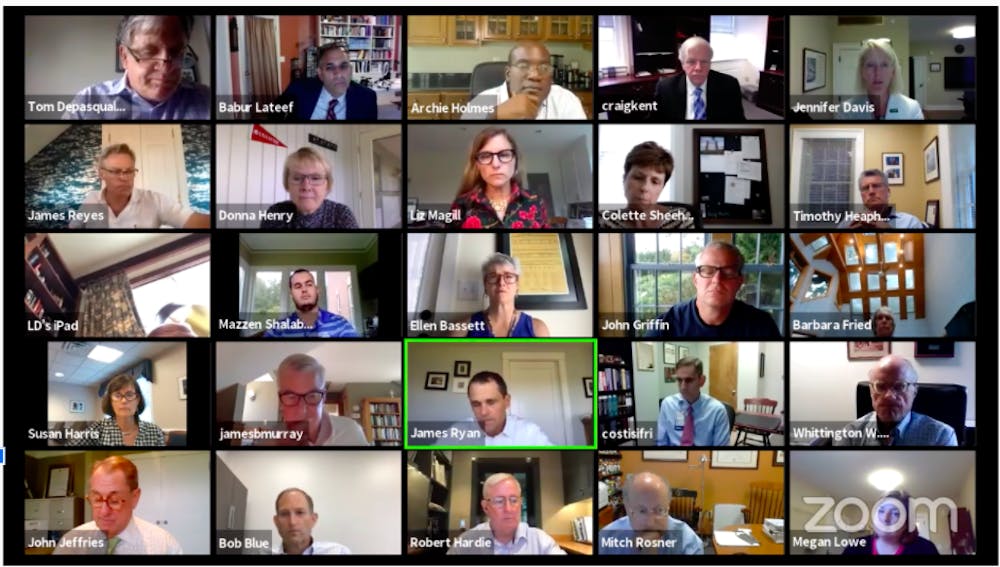The University Board of Visitors met July 31 to discuss the administration’s plans for a return to Grounds in the fall. Topics discussed included two COVID-19-tracking apps, the need for off-Grounds students to be prepared to quarantine off-Grounds and the planned response to an outbreak.
The work session occurred live on YouTube, and had more than 120 viewers throughout the stream. The stream began with 23 minutes of open session, during which members of the University administration addressed common concerns of the Board regarding the return to Grounds.
Jim Murray, vice rector of the Board, began the stream by emphasizing the dependence of the University’s plans on student compliance.
“We pride ourselves on a long tradition and history of student self-governance, and we're going to test that history over the coming months,” Murray said. ”And I think if we live up to our history … the plans we devise are going to work.”
According to Provost Liz Magill, seven different teams are working on different aspects of the return, from safety concerns to educational preparations.
Magill answered the first Board question, which asked whether students with health concerns would be screened and receive any guidance from the University to take all their classes online rather than in-person. Magill responded that for legal reasons, the University would not reach out to those students who might be at a higher risk of complications from COVID-19.
“Our expectation is that most students who are concerned about this would choose the option of taking all of their classes online, which is an option for any student,” Magill said.
Magill answered another question about whether the University could determine how many students are living in Charlottesville. She acknowledged that graduate students, medical and nursing students and athletes are already beginning to return. She also made it clear that it is not possible for the University to estimate the exact number of students but the administration knows that it will be a large number.
“Overall, about nearly 20,000 of our 25,000 students live in some off-campus arrangement,” Magill said. “How many are in Charlottesville now or how many will be in Charlottesville … is a little be more difficult to figure out.”
Jennifer “J.J.” Davis, executive vice president and chief operating officer, answered another question about what considerations would be available for students who get sick.
“Our highest duty of care is to those students living in our dormitories, so we have successfully captured both isolation and quarantine spaces for those individuals,” Davis said. “If there is an off-Grounds student who has no options to safely … quarantine we are working on that issue as we speak.”
Students planning to live off-Grounds are expected to quarantine or isolate in their off-Grounds housing if required, according to the University’s Return to Grounds website.
When asked about how the University plans to track COVID-19 cases, Murray spoke about the two apps the University is planning to use. One, HOOS Health Check, is a platform for students, faculty and staff to log their symptoms daily. The other, Covidwise, has been developed by the Virginia Department of Health. This app tracks interactions between users and notifies them if they have come in contact with someone who has become symptomatic or tested positive.
“The [Covidwise] app from the Virginia Department of Health … we got a confirmation this morning that it’ll be live on the fifth of August,” Murray said. “The exposure notification would track every student that’s downloaded it, and hopefully we’ll have 100% compliance.”
Further information about the two apps can be found in the “meeting documents” section of the work session announcement.
Davis described some of the contingency planning for a large outbreak, making it clear that there would be different levels of response.
“We could modify operations to the point where those who wish to return home could safely do so — obviously we want to provide an additional test so they could make sure there was no exposure if they were to return,” Davis said. “We could also go back to only essential operations. so we have multiple contingency plans.”
Chancellor of U.Va. WISE Donna Henry spoke to how the preparations are going at the college at WISE. Students will not be required to present a negative test before attending WISE.
“We currently have 430 students who plan to move into on-campus housing,” Henry said. “We have set aside rooms in one of our dormitories for isolation and quarantine as needed and are working through our clinic to provide some testing options for students.”
The Board then transitioned into a closed session to discuss proprietary details of the preparation for fall 2020.







